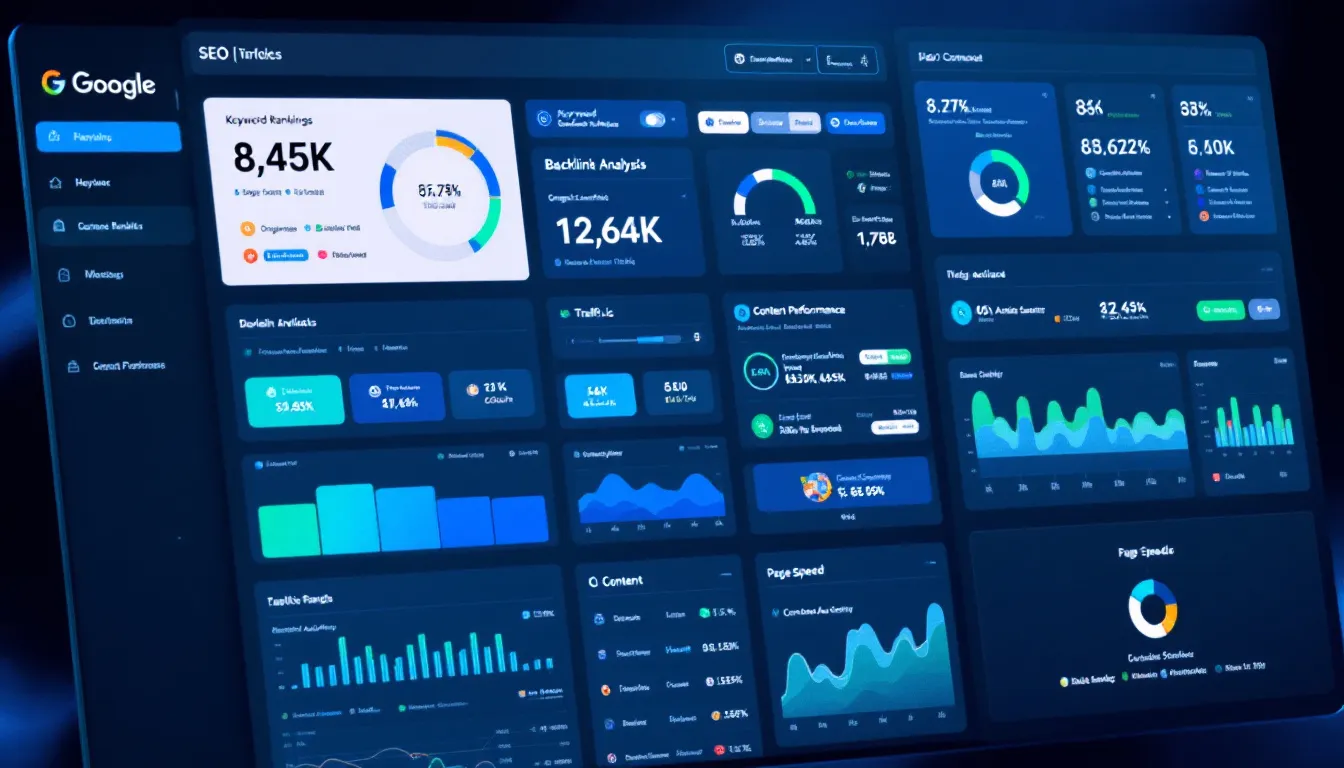Most small businesses spend $1,500-$5,000 monthly on search engine optimization agencies, only to see minimal results after six months. Meanwhile, local competitors with smaller budgets are outranking them in google search results using smart, cost-effective strategies that focus on what actually matters for local visibility.
Creating the best content is essential for building authority and trust. High-quality, useful, and well-crafted content not only aligns with search engine guidelines but also provides genuine value to users, which is crucial for long-term SEO success.
The truth is, effective low cost seo doesn’t require expensive tools or massive budgets. Instead, it demands strategic thinking, consistent execution, and a deep understanding of how search engines prioritize local businesses. For example, a small bakery updated its Google Business Profile with new photos and accurate hours, resulting in a surge of local search visibility and outranking a larger chain in their area. In this comprehensive guide, you’ll discover seven proven strategies that deliver real results without breaking the bank.
Whether you’re a small business owner frustrated with agency costs or an entrepreneur looking to compete against larger competitors, these tactics will help you build sustainable organic search traffic that converts into paying customers.

What is Low Cost SEO?
Low cost seo delivers search engine optimization results for $100-$500 per month instead of $1500+ typical agency fees. This approach focuses on high-impact, low-resource strategies that small businesses can implement themselves, emphasizing free tools, organic tactics, and community-based approaches over expensive software and advertising. While many free tools offer valuable insights, access to advanced features or detailed metrics may require a paid subscription, so it’s important to maximize the value of what you can access for free.
The key difference between low cost and cheap SEO lies in the methodology. While cheap SEO often relies on automation, black-hat practices, or one-size-fits-all solutions that can harm your website’s rankings, effective low cost SEO leverages manual, sustainable, white-hat techniques that target the most impactful areas within your budget.
Here’s how low cost SEO compares to traditional agency services:
| Service Component | Traditional Agency | Low Cost SEO | Monthly Savings |
|---|---|---|---|
| Keyword research | $300-500 | $0-29 (using free tools) | $271-471 |
| Content creation | $800-1200 | $100-300 (DIY + tools) | $500-900 |
| Link building | $500-800 | $50-150 (community focus) | $350-650 |
| Technical audits | $400-600 | $0-50 (free tools) | $350-550 |
| Total Monthly | $2000-3100 | $150-529 | $1471-2571 |
Low cost SEO prioritizes local search optimization where competition is lower and results are faster to achieve. Instead of competing against national brands with massive domain authority, you’ll focus on capturing local customers who are actively searching for services in your area.
This approach works particularly well because google’s search algorithm prioritizes relevance and proximity for local searches over traditional ranking factors like domain age or backlink quantity. A well-optimized local business website can outrank corporate giants in local map pack results with the right strategy.
Why Low Cost SEO Works Better for Local Businesses
Local search has 46% less competition than national keywords, making rankings easier to achieve for businesses with limited resources. When someone searches for “plumber near me” or “best pizza in downtown Denver,” google prioritizes proximity and relevance over domain authority, creating opportunities for small businesses to compete effectively.
Google prioritizes proximity and relevance over domain authority for local queries, which means your neighborhood bakery can outrank national food chains for searches like “fresh bread downtown” or “birthday cakes near Lincoln Elementary.” This shift in how search engines evaluate local content creates a level playing field where smart strategy beats big budgets.
Local customers convert 5x higher than national traffic due to immediate purchase intent. When someone searches for “emergency plumber” in their city, they’re not browsing – they’re ready to hire. This high-intent traffic means every visitor from local searches is significantly more valuable than generic organic traffic. To maximize results, analyze which local pages or keywords generate the most traffic and focus your optimization efforts on those areas to drive the highest visitor numbers and conversions.
Consider these compelling statistics that demonstrate why local focus works:
- 88% of local mobile searches result in a call or visit within 24 hours
- “Near me” searches have grown by over 200% in the past two years
- Local businesses with optimized citations see 50-70% higher visibility in map pack results
- 72% of consumers who perform local searches visit stores within five miles
Small businesses can outrank large corporations in local map pack results with proper optimization because search engines understand that users want nearby solutions. A local auto repair shop with consistent citations and neighborhood-specific content will rank higher than a national chain that doesn’t optimize for local search queries.
The key advantage lies in understanding your local target market intimately. You know the neighborhoods, local events, seasonal patterns, and community needs that bigger competitors miss. This local knowledge becomes your competitive advantage when creating content that resonates with people who actually search for your services.

Keyword Research and Planning on a Budget
Keyword research is the foundation of any successful search engine optimization strategy, and you don’t need a big budget to do it right. By identifying the keywords and phrases your target audience actually uses when searching for your services, you can create content that attracts more organic traffic and ranks higher in search results.
Start by using free or low-cost keyword research tools like Google Keyword Planner, Ubersuggest, or KeywordTool.io. These platforms help you discover relevant keywords, see how often people search for them, and understand how competitive each keyword is. Look for keyword ideas with a healthy balance of search volume and low competition—these are often long-tail phrases specific to your business or location.
Once you’ve gathered a list of keywords, organize them by topic and intent. Focus on keywords that match your services, location, and what your customers are searching for. Incorporate these keywords naturally into your website content, meta tags, and blog posts to improve your site’s visibility in search engine results.
Don’t forget to update your keyword list regularly. Search trends change, and staying up to date ensures your website continues to attract the right traffic. With a little in depth research and the right free tools, even businesses on a tight budget can create a powerful keyword strategy that drives more visitors to their site.
On-Page Optimization Essentials for Small Budgets
On-page optimization is all about making each page on your website as search engine-friendly as possible. For small businesses with limited resources, focusing on the essentials can make a big difference in your rankings and organic traffic.
Start by optimizing your title tags and meta descriptions—these are the first things users see in google search results. Make sure each page has a unique, keyword-rich title and a compelling meta description that encourages clicks. Use headings (H1, H2, H3) to structure your content and include relevant keywords where it makes sense.
Content optimization is key: write clear, helpful content that answers your customers’ questions and naturally includes your target keywords. Use internal linking to connect related pages on your site, helping both users and search engines navigate your content more easily.
Don’t overlook images—add descriptive alt text to every image and compress files to improve page load speed. Ensure your website is mobile-friendly, as more people search on their phones than ever before.
Free tools like Google Search Console can help you identify on-page issues and track your progress. By focusing on these core elements, you can boost your website’s rankings and attract more targeted traffic without spending a fortune.
Technical Optimization: Quick Wins for Non-Techies
Technical optimization might sound intimidating, but there are several easy wins that anyone can tackle to improve their website’s search engine rankings and organic traffic. Even if you’re not a tech expert, these steps can make a noticeable difference.
First, check your website’s speed and mobile responsiveness—two major ranking signals for search engines. Use free tools like Google PageSpeed Insights to see how your site performs and get actionable recommendations. Simple fixes like compressing images, enabling browser caching, and minimizing unnecessary plugins can speed up your site and enhance user experience.
Next, set up and submit a sitemap through Google Search Console. A sitemap helps search engines discover and index all the important pages on your website, ensuring your content appears in google search results. Most website platforms make it easy to generate a sitemap automatically.
Finally, regularly monitor your site for technical issues using free tools like Google Search Console. Look for crawl errors, broken links, or pages that aren’t being indexed, and address them promptly.
By focusing on these technical basics, you can improve your website’s performance in search engines and drive more organic traffic—all without needing advanced technical skills or expensive software.
Three Core Low Cost Local SEO Strategies That Build Real Authority
Strategy 1: Hyper-Local Content Creation
Creating neighborhood-specific landing pages targeting “[service] + [neighborhood]” keywords forms the foundation of successful local content strategy. Instead of generic service pages, develop dedicated pages for each area you serve, incorporating local landmarks, schools, and community references that demonstrate genuine local knowledge. Writing content that is well-written and tailored to local audiences is crucial for building authority and ensuring your pages resonate with both search engines and potential customers.
Write location-based blog posts about local events, news, and community happenings to establish your business as an active community member. This approach helps you rank for long-tail local search queries while building trust with potential customers who see you engaging with their neighborhood.
Here are three proven content types that drive local rankings:
Neighborhood Service Pages: Create separate pages for each service area, such as “Emergency Plumbing Services in Stapleton Denver” or “Wedding Photography in Cherry Creek.” Include local photos, customer testimonials from that area, and references to nearby landmarks that people actually search for. Ensure these pages are written by knowledgeable team members to reflect expertise and clarity.
Local Event Coverage: Write about community events, seasonal activities, and local news that relates to your business. A landscaping company might cover “Best Fall Plants for Denver Gardens” or “Preparing Your Yard for Colorado Winter Weather,” naturally incorporating local expertise.
Community Spotlight Content: Feature local customers, partner businesses, or community leaders in your content. These pieces often earn social shares and local backlinks while demonstrating your connection to the area.
Target long-tail keywords like “emergency plumber near Lincoln High School Denver” or “wedding photographer Cherry Creek Village” that your larger competitors overlook. These searches have lower competition but high conversion rates because they indicate specific local intent.
Your content calendar should include:
- Weekly neighborhood spotlight posts
- Monthly local event coverage
- Quarterly community guide updates
- Seasonal local service content
Regularly updating content is essential to keep information accurate and relevant for local searchers, which helps maintain and improve your search rankings over time.
Use keyword research tools like google search console and free platforms to identify what people actually search for in your area. Pay attention to seasonal patterns, local events, and neighborhood-specific terms that only locals would use.
Strategy 2: Building Local Citations and Links
Submit to local business directories like Yellow Pages, Yelp, and industry-specific platforms to establish consistent NAP (Name, Address, Phone) citations across the web. Search engines use these citations to verify your business legitimacy and determine local ranking positions.
Get listed on Chamber of Commerce websites and local business association directories, which provide high-authority local backlinks that significantly impact your local search rankings. These organizations typically have strong domain authority and clear geographic relevance.
Essential Citation Sources:
- Google business profile (highest priority)
- Yelp, yellowpages.com, superpages.com
- Industry-specific directories (Angie’s List for contractors, Avvo for lawyers)
- Local chamber of commerce and business associations
- City and county government business directories
Partner with complementary local businesses for cross-promotional linking opportunities. A wedding photographer might partner with local venues, caterers, and florists to create mutual linking relationships that benefit everyone’s local SEO efforts.
Sponsor local events, sports teams, or charity drives for backlinks on organization websites. These sponsorships often cost $100-500 but provide lasting backlinks from authoritative local sites while supporting your community.
Partnership Outreach Template: “Hi [Business Name], I’m [Your Name] from [Your Business] here in [City]. I noticed we serve many of the same customers and thought we could help each other by featuring each other’s services on our websites. Would you be interested in exploring a partnership where we recommend each other to appropriate clients?”
Create partnerships with local suppliers, contractors, and service providers for mutual linking. When your business is linked from other reputable local sites, search engines are more likely to discover and trust your website. A restaurant might link to local farms and suppliers, while those businesses link back to the restaurant in their “customers we serve” section.
Track your citation building progress using free tools like google search console and monitor your local rankings to measure the impact of each new citation or local link you acquire.
Strategy 3: Community Engagement on Social Media
Join local Facebook groups and provide helpful advice without direct selling to build relationships and establish expertise in your community. Most cities have active Facebook groups where residents ask for service recommendations, creating perfect opportunities to demonstrate knowledge and build trust.
Share local news, events, and community updates to establish thought leadership while staying relevant to your audience. This content strategy helps you stay visible in local feeds and positions your business as a community-focused organization.
Effective Local Social Media Tactics:
- Join 5-10 active local Facebook groups in your service area
- Share helpful tips and advice 2-3 times per week
- Post local event information and community news
- Create location-tagged posts featuring local customers and projects
- Use local hashtags like #[YourCity]Business and #[YourCity]Local
Engage with other local business posts through comments and shares to build relationships with potential referral partners. When you consistently support other businesses on social media platforms, they’re more likely to recommend your services and share your content. If your business participates in or hosts online forums, it’s important to monitor forum posts and ensure that any links are properly managed to prevent spam and protect your site’s SEO.
Create location-tagged posts on Instagram and TikTok featuring local customers and projects to increase local visibility. These posts help you appear in location-based searches and demonstrate your active presence in the community.
Use local hashtags strategically to increase visibility among local audiences. Research popular hashtags in your area and create a mix of broad local tags (#DenverBusiness) and specific neighborhood tags (#CapitolHillDenver).
Monthly Social Media Engagement Calendar:
- Week 1: Share 3 helpful tips in local groups, post 2 customer features
- Week 2: Share local event information, engage with 10 other local business posts
- Week 3: Post neighborhood-specific content, participate in community discussions
- Week 4: Share monthly community round-up, thank local customers publicly
Monitor local hashtags and location tags to find conversation opportunities and stay current with community trends. Many local customers discover businesses through social media engagement before they even perform a google search.

5 Additional Low Cost SEO Tactics Beyond Google Business Profile
Optimize for voice search with conversational, question-based content and FAQ sections. Voice searches typically use natural language patterns like “Where can I find a good mechanic near me?” rather than typed keywords like “auto repair Denver.” Create content that answers these conversational queries directly.
Structure your content to answer common questions your customers ask. Create FAQ sections that address specific local concerns, such as “Do you serve the Highlands neighborhood?” or “What’s your response time for emergency calls in downtown Denver?”
Create video content for YouTube targeting local search terms and embed on website. YouTube is owned by google and ranks prominently in search results for local queries. Create videos showing your work process, customer testimonials, or local area expertise to capture video search traffic. Regularly publishing new content, such as updated videos or blog posts, helps keep your website fresh and relevant for both users and search engines.
Local video content ideas include:
- “Tour of [Your City] neighborhoods we serve”
- Customer testimonial videos with local references
- Behind-the-scenes content showing local projects
- Educational videos addressing local-specific challenges
Build email list through local lead magnets and send regular community newsletters. Offer valuable local resources like “Denver Home Maintenance Calendar” or “Complete Guide to [Your City] Business Permits” to capture email addresses and maintain ongoing customer relationships.
Implement schema markup for LocalBusiness to help search engines understand your location. This structured data helps google display rich snippets with your business information, hours, and reviews directly in search results. Most website platforms offer plugins that make schema implementation simple.
Submit a sitemap file to search engines to help them index all your important pages, including any new content you add. If your website has multiple URLs for similar content, use canonical tags or 301 redirects to consolidate authority and avoid duplicate content issues. Make sure that other pages on your website are properly linked and discoverable by search engines to maximize visibility.
Monitor and respond to online reviews across all platforms to improve local reputation. Review management significantly impacts local rankings, with businesses that respond to reviews seeing 12% higher rankings on average. Set up alerts for new reviews and respond professionally to all feedback within 24-48 hours.
Use free tools like google alerts to monitor mentions of your business name and respond quickly to any online discussions about your services. Proactive reputation management prevents small issues from becoming major problems.
Structured Data and SEO: Simple Schema Markup for Local Businesses
Structured data, or schema markup, is a powerful way to give search engines more context about your business and its services. For local businesses, adding schema markup can help your website stand out in search results and attract more targeted traffic.
Schema markup allows you to highlight important details like your business name, address, phone number, hours of operation, and services. This extra layer of information helps search engines understand your business better, increasing the chances of appearing in rich results such as local packs, knowledge panels, and map listings.
Implementing schema doesn’t have to be complicated. Free tools like Google’s Structured Data Markup Helper make it easy to generate the necessary code for your website. Simply select the type of business you have, fill in your details, and add the generated code to your site.
By leveraging structured data, you give your business a competitive edge in local search results, improve your rankings, and make it easier for customers to find the information they need—all with minimal investment and no advanced coding required.
Common SEO Mistakes to Avoid (and How to Fix Them for Free)
Even with the best intentions, it’s easy to make SEO mistakes that can hurt your website’s rankings in search engines. The good news is that most common issues can be fixed using free tools and a bit of attention to detail.
One major mistake is duplicate content—having the same content on multiple pages or URLs. This confuses search engines and can dilute your site’s authority. Use Google Search Console to identify duplicate pages, then fix them by consolidating content, setting up 301 redirects, or adding canonical tags to point search engines to the right page.
Another frequent issue is unoptimized images, which can slow down your website and negatively impact rankings. Compress your images using free tools and always add descriptive alt text to help search engines understand what each image shows.
Avoid keyword stuffing—cramming too many keywords into your content. Instead, focus on writing helpful, engaging content that naturally includes your target keywords. High-quality content is a major source of organic traffic and helps your site rank higher in google search results.
By regularly reviewing your website with free tools like Google Search Console and staying focused on best practices, you can avoid these common pitfalls and keep your SEO efforts on track—without spending a dime.
Essential Free and Low Cost SEO Tools for 2025
Google business profile and google search console for local optimization and performance tracking provide comprehensive insights into how your business appears in local searches. These free tools from google offer the most accurate data about your local search performance and should be your primary monitoring platforms.
Google search console shows which search queries bring visitors to your site, which pages rank highest, and technical issues that might impact your rankings. Set up weekly reports to track progress and identify optimization opportunities.
Ubersuggest ($29/month) or Keywords Everywhere ($10/month) for keyword research help you identify local search opportunities and competition levels. These affordable keyword tools provide search volume data and competition analysis specifically for local markets. It’s important to select a reliable keyword tool to ensure you’re working with accurate data for your research. When using these tools, focus on targeting specific keyword phrases that are most relevant to your local audience to improve your search visibility.
Keywords Everywhere integrates directly with google search results, showing search volume and competition data as you browse. This real-time data helps you identify content opportunities while researching competitors or planning new pages.
Canva (free) for creating local business graphics and social media content enables professional-looking visual content without design experience. Use Canva’s templates to create social media posts, infographics, and website graphics that reinforce your local brand.
Google analytics 4 for tracking website traffic and conversion sources provides detailed insights into how local visitors find and interact with your website. Set up goal tracking to measure which SEO efforts drive actual business results, not just traffic.
BrightLocal ($29/month) for citation building and local rank tracking offers specialized tools for managing local SEO campaigns. This platform helps you track local rankings, audit citations, and monitor online reputation across multiple platforms from one dashboard.
| Tool Category | Free Option | Low Cost Option | Monthly Cost | Best For |
|---|---|---|---|---|
| Local Analytics | Google Analytics 4 | Google Analytics 4 Pro | Free | Traffic tracking |
| Keyword Research | Ubersuggest Free | Ubersuggest Pro | $29 | Local keyword ideas |
| Citation Management | Manual tracking | BrightLocal | $29 | Citation audits |
| Content Creation | Canva Free | Canva Pro | $15 | Social media graphics |
| Rank Tracking | google search console | SEMrush | $99 | Position monitoring |
Focus your tool budget on platforms that provide actionable data for local optimization rather than expensive enterprise software designed for large agencies. Most successful local SEO campaigns use 3-4 core tools consistently rather than dozens of different platforms.

90-Day Low Cost SEO Implementation Timeline
Days 1-30: Set up Google business profile, audit existing citations, and create 4 hyper-local content pieces
The internet provides small businesses with the tools and platforms needed to implement and track low cost SEO strategies effectively.
Week 1: Complete google business profile optimization with accurate NAP information, business hours, categories, and high-quality photos. Upload at least 10 photos showing your business interior, exterior, team, and products or services.
Week 2: Audit your current citations using free tools to identify inconsistencies in your business name, address, or phone number across different platforms. Create a spreadsheet tracking all existing citations and their accuracy.
Week 3-4: Create your first four pieces of hyper-local content targeting specific neighborhoods or service areas. Focus on one piece per week, ensuring each targets different local keywords and addresses specific community needs.
Days 31-60: Build 15 local citations, establish 3 business partnerships, and launch social media engagement
Week 5-6: Submit your business to 15 high-quality local directories, prioritizing platforms with strong domain authority and local relevance. Focus on accuracy and consistency rather than quantity.
Week 7: Reach out to 10 potential local business partners using your outreach template. Aim to establish 3 partnerships that provide mutual linking opportunities and potential referral relationships.
Week 8: Join 5-10 local Facebook groups and begin regular engagement. Start following local hashtags on Instagram and identify other local businesses to engage with on multiple platforms.
Days 61-90: Create 8 more content pieces, earn 5 local backlinks, and optimize based on performance data
Week 9-11: Publish 8 additional content pieces, focusing on seasonal topics, local events, and community news that relates to your business. Aim for 2-3 pieces per week during this phase.
Week 12: Actively pursue 5 local backlinks through community involvement, local partnerships, or media coverage. Track your progress using google search console to monitor new linking domains.
Week 13: Analyze your 90-day results using google analytics and search console data. Identify your highest-performing content and most effective tactics to guide your ongoing strategy.
Monthly budget breakdown: $150 total including tools, content creation, and local sponsorships
- SEO tools: $50 (Ubersuggest + Keywords Everywhere)
- Content creation tools: $15 (Canva Pro)
- Local sponsorship/event participation: $85
- Miscellaneous (photos, graphics): $0 (using free tools)
This budget assumes you’re handling implementation yourself rather than hiring external help. Most tasks require time investment rather than financial resources, making this approach accessible for businesses with limited marketing budgets.
Track your weekly progress using a simple spreadsheet with columns for content created, citations built, partnerships established, and social media engagement metrics. Weekly check-ins help maintain momentum and identify any areas where you’re falling behind schedule.
Measuring Low Cost SEO Success and ROI
Track local map pack rankings for target keywords using free position tracking tools to monitor your progress in local search results. Set up weekly checks for your most important local keywords to identify ranking improvements and opportunities.
Use google search console to track your rankings for specific local search queries. Look for improvements in average position and click-through rates for location-based keywords that drive business value. It’s also crucial to maintain your website’s presence in google’s index, as being removed or penalized from google’s index can significantly impact your SEO results and visibility.
Monitor google business profile views, clicks, and calls through monthly performance reports to measure the direct impact of your local SEO efforts. Google provides detailed analytics showing how customers find and interact with your business profile.
Key metrics to track include:
- Profile views (how many people see your business in search results)
- Website clicks (traffic driven from your google business profile)
- Direction requests (people looking for your physical location)
- Phone calls generated through your profile
Measure website traffic from organic search and local landing page conversions using google analytics 4 to understand which content drives actual business results. Set up conversion tracking for contact form submissions, phone calls, and appointment bookings.
Create custom reports showing traffic sources for each local landing page and track conversion rates for neighborhood-specific content. This data helps you identify which areas generate the most valuable traffic and deserve additional optimization focus.
Calculate cost per lead comparing SEO results to paid advertising performance to demonstrate the value of your organic search efforts. Track the total monthly cost of your SEO activities and divide by the number of qualified leads generated.
Most local businesses see cost per lead from SEO of $15-50 compared to $75-200 for paid advertising, making organic search significantly more cost-effective over time. Document these savings to justify continued investment in SEO activities.
Document customer acquisition sources to prove SEO-generated business value by asking new customers how they found your business and tracking the revenue generated from SEO-sourced clients.
| Metric Category | Monthly Tracking | Goal | Notes |
|---|---|---|---|
| Local Rankings | Top 10 keywords | 3-5 position improvement | Use google search console |
| Profile Performance | Views, clicks, calls | 20% monthly increase | From google business profile insights |
| Website Traffic | Organic search visits | 25% monthly growth | Track in google analytics |
| Conversion Rate | Contact forms, calls | 3-5% conversion rate | Set up goal tracking |
| Cost Per Lead | Total cost / leads | Under $50 per lead | Compare to paid advertising |
Create a monthly dashboard combining data from google analytics, search console, and your business profile to track progress across all key metrics. Regular reporting helps you identify successful tactics and areas needing improvement.
Set up automated monthly reports using google analytics to track your most important metrics without manual data collection. Focus on trends over absolute numbers, as local SEO results compound over time rather than delivering immediate dramatic changes.
The most successful low cost SEO campaigns focus on consistent improvement rather than dramatic short-term gains. Track your progress monthly but evaluate success quarterly, as search engine optimization delivers the best results through sustained, strategic effort rather than quick fixes.

These seven proven low cost SEO strategies demonstrate that effective search engine optimization doesn’t require massive budgets or expensive agency fees. By focusing on local optimization, community engagement, and consistent content creation, small businesses can compete effectively against larger competitors while building sustainable organic traffic.
The key to success lies in consistent implementation rather than perfect execution. Start with the 90-day timeline, focus on one strategy at a time, and measure your progress using the free tools and metrics outlined in this guide. Remember that SEO is a long-term investment that compounds over time, making small daily efforts more valuable than sporadic intensive campaigns.
Your local community needs the services you provide, and these strategies help you connect with customers who are actively searching for solutions you offer. Begin implementing these tactics today, and you’ll see measurable improvements in your local search visibility within 90 days.

